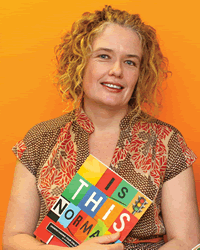 This is Part 2 in a 3 part series about Communicating with children and young people about sexuality.
This is Part 2 in a 3 part series about Communicating with children and young people about sexuality.
What do you know about puberty? You probably already know a lot, but how comfortable are you talking about it?.
Use this quiz to check what you know or to help you feel more competent and comfortable talking with the young people in your life about puberty.
.
Choose true (T) or false (F).
Puberty quiz
1. Puberty generally happens between 9-16 years of age.
2. As bodies change, feelings can change too.
3. Everyone goes through puberty at a different pace.
4. Getting pimples is normal during puberty.
5. It’s OK to touch the private parts of your body if you are in a private place.
6. All girls get their periods around the same age.
7..When a boy has a wet dream, it means that he has wet the bed.
8. Puberty changes are the body’s way of preparing for the possibility of making babies.
9. Boys sometimes experience some breast development at puberty.
10. It is a time when young people might experience loving or sexual feelings as well as attraction to other people.
*Answers can be found at the end of this article.
So, how do you feel you went? Talking about puberty with young people can be fun as well as reassuring. If you are a parent or carer making time to share information and experiences, beliefs and values as a family is important. As a teacher or professional, having discussions, providing learning activities and resources regarding the physical, social and emotional changes of puberty is part of the National Health and Physical Education Curriculum and a rewarding part of your job.
Some tips:
• You do not have to be the expert. Finding out information together can be a great
• Be aware of your own comfort level as well as your right to privacy. You don’t have
to talk about your own experiences in detail.
• Use your sense of humour, be factual and stay positive.
• Talking about puberty is more than a one off chat. Discuss topics that come from everyday life including TV shows and other media, the internet, school work and social occasions.
• Help young people learn to access information in an ongoing and critical way.
Some facts:
Puberty describes the period of time when a child develops physically to sexual maturity and experiences significant emotional and social changes.
For most young people, puberty begins between the ages of 9 and 16. The hormone gonadotrophin is released from the pituitary gland at the base of the brain and hormones are released from the ovaries in girls and the testicles in boys. This causes the female’s ova (eggs) to mature and be released, and the male to produce sperm.
When should puberty discussions start?
Learning about puberty can start in early childhood, with information reinforced and expanded on in the years leading up to puberty. Puberty is just one part of understanding about growth and development.
What happens when puberty occurs?
The age puberty occurs will depend on a number of things, including diet, exercise, amount of body fat and heredity (the age when a child’s parents began to go through puberty). Most girls will notice their bodies changing around the age of 10 or 11 and most boys will notice changes around the age of 12 or 13. All young people will experience puberty differently.
Physical changes
Both girls and boys:
- growth spurt
- weight increase
- pubic hair
- underarm hair
- face changes shape
- sweating increases
- skin becomes oilier
- acne may develop
Boys:
- chest and shoulders broaden
- body becomes more muscular
- penis and testicles enlarge and darken
- sperm is produced in the testicles
- ejaculation occurs (wet dreams)
- voice becomes deeper
- facial and chest hair develops
Girls:
- nipples enlarge and darken
- pelvis becomes wider
- vaginal discharge increases
- increase of fat on breasts, hips and thighs
- breasts develop
- genitals become darker in colour
- ovulation begins, followed by
- menstruation (periods)
Some important points to discuss:
Periods
Most females menstruate about every 28 days and the period will last for approximately 3 to 7 days. This may vary from month to month. During the first year or two, a girl’s period may be quite irregular.
It is difficult to tell exactly when a girl’s first period will start. Before it happens most girls will experience increased vaginal discharge and other signs of physical development. As soon as the beginning of puberty is obvious she should keep a supply of pads and a change of pants in her school bag. Encourage her to practice wearing a pad before her periods begin.
There is no physical reason why a young girl cannot use tampons. However, using pads for the first few times at least will allow her to become familiar with the amount of blood loss. If she does choose to use tampons, it is important for her to use pads overnight to reduce the risk of toxic shock syndrome. Read the directions in the pack of tampons with her and encourage her to follow that advice.
Breast development – girls and boys
Some girls will feel soreness or tenderness as their breasts develop. This is due to growth and changing hormone levels. This is quite normal. Wearing a well-fitting bra may help. Some girls may notice one breast grows first, or is slightly larger. This is not unusual.
There is no ‘right’ age for a girl to start wearing a bra. Some girls wish to wear one quite early and begin with a ’crop top’ or ‘training’ bra. Other girls may wish to wait and get a fitted with their first bra.
Boys may also experience some breast development, but this will be temporary. Give reassurance that this will settle down as soon as his body adjusts to changing hormone levels. Until this happens he may wish to wear loose fitting shirts.
Acne
Pimples are caused when an oily substance called sebum blocks the pores or ducts of the skin. At puberty the amount of sebum increases, causing pimples to occur in varying degrees of severity. It is a myth that pimples are caused by eating sweet or fatty foods. Severe acne is more common in males than females and is often an inherited condition. Even a very mild case of acne can cause a young person to be self conscious, so take their concerns seriously.
To prevent or treat pimples, wash the face with warm water and a mild soap twice a day and gently dry. Hair should be kept clean and away from the face. Avoid harsh scrubbing, steam treatments and moisturisers. Squeezing pimples or blackheads can cause scarring and increase the risk of infection. Severe acne should be assessed by a general practitioner or dermatologist.
Wet dreams
A wet dream occurs when a male ejaculates semen while asleep. It happens in response to the body producing sperm. Usually when a boy has a wet dream he will also experience pleasurable feelings. All boys will have a wet dream at some stage, with most beginning about 13 or 14 years. It may only happen occasionally or it may be quite frequent.
Boys need to be reassured that wet dreams are normal. The amount of semen is only about 5 mls (1 teaspoon), so it won’t make much of a mess and can be easily cleaned up with a wet cloth, tissues or by washing pyjamas or sheets.
Erections
When a boy reaches puberty he will experience more frequent erections. Sometimes this may happen for no apparent reason and at an inappropriate time or place. He may find this very embarrassing, but it is unlikely that anyone else will notice.
The best way to make erections go away is for him to think of something boring. He may wish to wear clothes that make erections less noticeable such as board shorts over his swimming togs and well fitting jeans instead of track pants.
Voice changes
When a boy goes through puberty his larynx grows and his voice becomes deeper. This change can be very gradual or it can happen quickly. The boy’s voice may ‘crack’. If this bothers him, suggest he try to speak in a low, even tone and try to avoid ‘excited’ high notes. Girls’ voices also change, but less so and it is rarely noticeable.
Weight gain and body image
Both boys and girls may experience weight gain around the time of puberty. With so many media messages telling young people that they should be thin or muscular, it is not surprising that many young people develop unrealistic expectations about what a healthy body looks like.
Social and emotional changes and emerging independence
Puberty will also affect the way young people think, feel and act. Their relationship with adults will change as they move from being a dependent child to an independent adult. This is a normal and important stage of development.
They may start to spend more time with their friends and less with their family and when they are at home, spend more time in private. It is not unusual for children and parents/carers to disagree. The child’s ability to analyse and reason is developing, so arguing with family and other adults is one way of testing these new skills. Try to stay calm and hear their concerns before discussing your point of view.
Mood swings caused by hormonal changes are also common. Their peer group is becoming more important and they may be feeling pressure to do as their friends are doing or wear what ‘everyone’ is wearing. When you do disagree, explain why you have made your decision and what your concerns are. Be prepared to compromise.
Developing sexual feelings
Relationships
It is common for young people to develop strong feelings for people of the other sex, the same sex, or both. Having these feelings is a healthy way for young people to learn about relationships and sexuality.
These can be short-lived crushes, which may or may not extend to more serious relationships as adolescence progresses. Everyone is different. Some people form committed relationships very early, while others show little or no interest until later.
Masturbation
For many young people, masturbation is their first experience of sexual activity. Nearly all boys and girls masturbate at some time during adolescence. Some only masturbate occasionally, while for others it is a regular activity. An adolescent’s sex drive can be very strong. Masturbation is one way of gaining sexual pleasure and releasing sexual tension without the risks associated with early sexual intercourse. Masturbation is healthy as long as it happens in private and without feelings of guilt.
Where do I go for more information about sexuality education?
For further reading, visit www.fpq.com.au for reference to FPQ’s book catalogue and parent education factsheets www.fpq.com.au
QUIZ ANSWERS
1. T 2. T 3. T 4. T 5. T 6. F 7. F 8. T 9. T 10. T
Part 3: “What’s wrong with selfies? Everyone does it” Talking to young people about online and offline relationships.
Holly presents in house seminars to schools Australia Wide …Consults on Sex ed program implementation and development.
Holly Brennan
Manager, Research and Innovation
Family Planning Queensland
email: hbrennan@fpq.com.au



